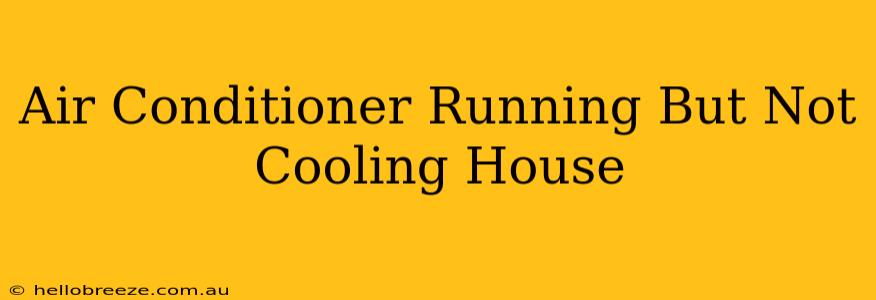Is your air conditioner running, but your house isn't getting any cooler? This frustrating problem can stem from several sources. Before calling a pricey HVAC technician, let's troubleshoot some common culprits. This guide will help you diagnose the issue and potentially fix it yourself, saving you time and money.
Common Reasons Why Your AC Isn't Cooling
Several factors can cause your AC unit to run without effectively cooling your home. Let's explore the most frequent issues:
1. Dirty Air Filter
This is the most common and easiest problem to fix. A clogged air filter restricts airflow, forcing your AC unit to work harder and potentially overheat. This can lead to reduced cooling capacity or even complete failure.
- Solution: Check your air filter. If it's dirty or dusty, replace it with a new one. This simple step often solves the problem immediately. Remember to consult your AC unit's manual for the correct filter size and type. Consider scheduling regular filter changes (typically monthly during peak use) to prevent this issue in the future.
2. Refrigerant Leaks
A refrigerant leak is a more serious issue that requires professional attention. Refrigerant is essential for cooling, and a leak means your system can't cool properly. You might notice a hissing sound or a lack of cold air coming from the vents. Do not attempt to repair this yourself. Improper handling of refrigerant can be dangerous.
- Solution: Contact a qualified HVAC technician to locate and repair the leak. They have the necessary equipment and expertise to handle refrigerant safely and efficiently.
3. Frozen Evaporator Coil
Ice buildup on the evaporator coil (located inside your indoor unit) restricts airflow, preventing the system from cooling effectively. This can be caused by a dirty air filter, low refrigerant, or a faulty blower motor.
- Solution: If you notice ice on the evaporator coil, turn off your AC unit and allow it to thaw completely. Once thawed, check the air filter and consider calling a professional to check for other underlying issues like refrigerant levels or blower motor problems. Addressing the root cause is crucial to prevent future freezing.
4. Clogged Condenser Coils
The condenser coils (located outside) dissipate heat. If they are dirty or clogged with debris like leaves, grass clippings, or dirt, they can't release heat efficiently, reducing cooling capacity.
- Solution: Carefully clean the condenser coils using a coil cleaning brush or a garden hose with a low-pressure nozzle. Always disconnect the power to the unit before cleaning. Avoid high-pressure water, as it can damage the fins. Regular cleaning (at least once a year) can prevent this issue and prolong the life of your AC unit.
5. Blower Motor Problems
A malfunctioning blower motor can prevent proper air circulation, leading to poor cooling. You might hear unusual noises from the unit or notice inconsistent airflow.
- Solution: This is another issue best addressed by a qualified HVAC technician. They can diagnose the problem and determine whether the motor needs repair or replacement.
6. Electrical Issues
Problems with the electrical wiring, capacitor, or other electrical components can prevent your AC unit from functioning correctly. This can manifest in several ways, including the unit not turning on, running intermittently, or failing to cool.
- Solution: This also requires the expertise of a professional electrician or HVAC technician. Do not attempt to repair these issues yourself, as they can be dangerous.
Preventative Maintenance for Your Air Conditioner
Regular maintenance is crucial for keeping your AC unit running efficiently and preventing costly repairs. Consider these preventative measures:
- Regular air filter changes: As mentioned earlier, this is a simple yet highly effective way to keep your system running smoothly.
- Annual professional inspection: A qualified technician can identify and address potential problems before they become major issues.
- Clean condenser coils: Keeping the outdoor unit clean enhances its performance and lifespan.
By addressing these potential problems, you can significantly improve your chances of restoring your AC's cooling power. Remember, however, that some repairs require professional expertise, so don't hesitate to call a qualified technician if you're unsure about tackling a specific issue. A small investment in maintenance can save you substantial costs and discomfort in the long run.

